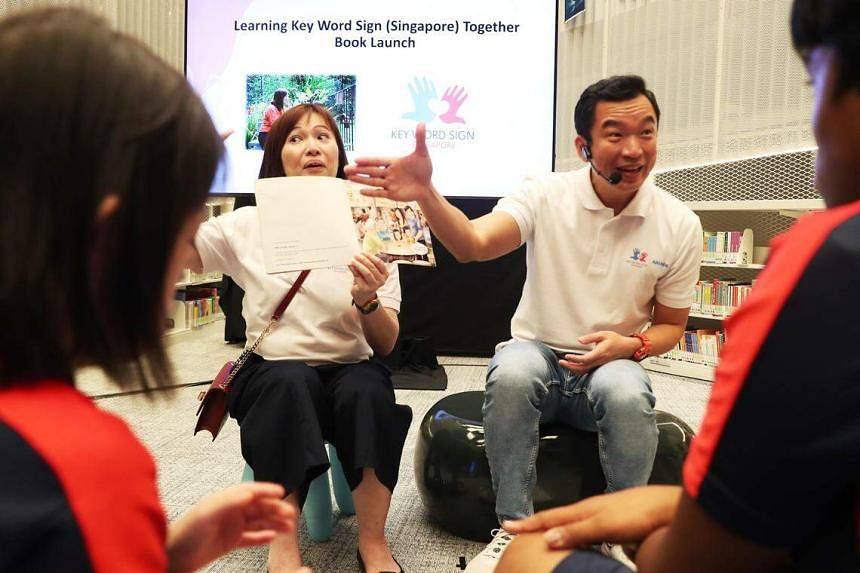SINGAPORE – It is like a guessing game trying to understand her 13-year-old daughter, who has Down syndrome, said Ms Angeline Oer.
Her daughter, Lenette, struggles to express her thoughts and usually points to show what she wants. Occasionally, Lenette becomes frustrated and resorts to shouting.
But basic sign language for those with speaking difficulties has reduced the guesswork for caregivers such as Ms Oer, 52, as their children learn to express their thoughts through simple gestures, which are easier to memorise.
This was introduced as Key Word Sign in schools run by the Movement for the Intellectually Disabled of Singapore (Minds).
This gestures-based communication system is different from sign language as it is designed to be used while speaking, by those who can hear but may have difficulty putting words together.
“Lenette has been teaching me some new words she learnt from school. She can ask for specific items now, like when she wants water,” said Ms Oer, gesturing in sign by raising three fingers to her mouth, indicating water.
For the first time, localised versions of Key Word Sign have been compiled into three books to help caregivers and professionals connect with those with intellectual disabilities. The books were released on Sunday at Punggol Regional Library for borrowing and for sale.
Launched in 2020, Key Word Sign (Singapore) is a communication method created by Minds and is taught to clients across its centres.
The gestures come in handy especially in classrooms or in crowded areas when those with special needs may not feel confident to speak up, said Ms Eva Loh, head of speech and language therapy at Minds, which supports about 4,500 clients of all ages.
The three books, priced between $26 and $56 each, include comic-like illustrations of about 700 signs that convey simpler terms, such as food and locations, and also more sophisticated words to express time-related terms.
Basic Key Word Sign workshops aimed at professionals, caregivers and families are also available.
The gestures are based on the Australian version of Key Word Sign, but adapted for Singapore with terms that locals use frequently, including common food such as curry puff and popiah, and festivals such as Thaipusam.
Ms Oer said the books will serve as a convenient reference for her when communicating with Lenette, who regularly learns new gestures in school.
Ms Oer, an operations manager, intends to share the book with her three other children so that they can understand Lenette better.
“Lenette is happy when others are able to understand her,” said Ms Oer. “It boosts her confidence and encourages her to become more vocal and speak up more.”

Madam Anupriya Bacthavachalam, 39, said the book will help to build her repertoire of gestures to use while talking to her daughter, Tanya, 13, who has autism.
She added: “Sometimes she can get upset and it’s hard to communicate, but now I have some gestures to indicate to her what she should do, like to breathe slowly and be calm.”
Ms Loh, who oversaw the books’ development, said that roughly half of the students at Minds have been exposed to Key Word Sign.
“With the new resource, we hope to take this to the next level and proliferate the use of Key Word Sign to support anyone who faces challenges in speech or communication,” Ms Loh said at the book launch, attended by around 50 caregivers, children and social workers.

Mr Eric Chua, Senior Parliamentary Secretary for Social and Family Development, read a storybook to children using Key Word Sign gestures after learning roughly 30 words before the launch of the books.
He said in his speech: “I’ve some way to go, but I hope I’ve shown that learning this is not insurmountable, and I encourage everyone to pick it up.”
“With your support, persons with communication difficulties will be able to seek assistance more easily and feel more confident in navigating public spaces and be more independent.”


